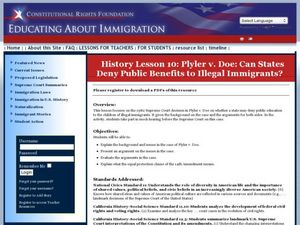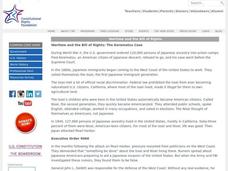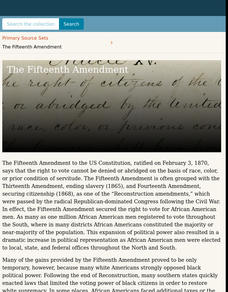Curated OER
Democracy Sense
Students define democracy and distinguish representative from direct or pure democracy. Then, with the focus on representative government, students will discuss and trace voting patterns in the United States.
PBS
The March on Washington and Its Impact
High schoolers read Martin Luther King, Jr's speech that he gave in Washington. They identify the social conditions that led to the civil rights movement. They discuss the significance of the March on Washington.
Curated OER
History Lesson 10: Plyler v. Doe: Can States Deny Public Benefits to Illegal Immigrants?
Students consider the rights of illegal immigrants. In this illegal immigration lesson, students analyze the Supreme Court case Plyler v. Doe and determine whether illegal immigrants should have access to public benefits. Students...
Curated OER
Wartime and the Bill of Rights: The Korematsu Case
Students examine the balance between civil liberties and protection. For this national security lesson, students explore the Korematsu case which references the Japanese internment camps of World War II. Students draw comparisons between...
Museum of Tolerance
Making Lemonade: Responding to Oppression in Empowering Ways
An activity focused on tolerance encourages class members to consider how they might respond when they or someone else is the target of oppression and discrimination. After researching how some key figures responded to the anti-Semitism...
Atlanta History Center
Civil Disobedience and the Atlanta Student Movement
What tactics are used in civil disobedience? Learners study the conditions in Alabama that led to the establishment of the Atlanta Student Movement, as well as consider the nature and effectiveness of civil disobedience.
US House of Representatives
“‘The Negroes’ Temporary Farewell,” Jim Crow and the Exclusion of African Americans from Congress, 1887–1929
Despite some advances made during the Reconstruction Era following the Civil War, the period from 1887 through 1929, African Americans serving in Congress suffered severe setbacks due to Jim Crow Laws and voter suppression. Class members...
Digital Public Library of America
The Fifteenth Amendment
Fifteen primary sources provide a context for a study of the Fifteenth Amendment to the United States Constitution. The packet captures the excitement for the changes promised by the amendment as well as the backlash against it.
US House of Representatives
“The Fifteenth Amendment in Flesh and Blood,” The Symbolic Generation of Black Americans in Congress, 1870–1887
The reading of a contextual essay launches a study of Black Americans who served in Congress from 1870 through 1887. Young historians identify the African Americans who served during this period, investigate the ways they won national...
Curated OER
English Constitutional Monarchy
Whether you are teaching British Literature, British History, or are simply interested in the history of English politics, this presentation takes the viewer on a journey through 600 years of England's royal and political upheavals....
National Endowment for the Humanities
Cultural Change
High schoolers research the passage of the 19th Amendment as an illustration of the mutual influence between political ideas and cultural attitudes. They also read the Seneca Falls Declaration and explore the cultural shifts it both...
Curated OER
US History
In this US History worksheet, students complete the crossword puzzle using the clues at the bottom of the page. There are 34 clues in total on this worksheet.
Curated OER
Marching For Freedom
Students appreciate the sacrifices that people from across the country made to ensure that all citizens could exercise their constitutional right to vote. They access excellent websites and documents imbedded in this plan to guide their...
Curated OER
Paul Conrad's Perspective on Civil Rights
Students review a political cartoon and discuss desegregation. In this cartoon analysis lesson, 11th graders discuss the impact of a political cartoon and its relation to a Supreme Court case. Students read additional information and...
Curated OER
U.S. Constitution - Selecting the President
Learners study how the electoral college works to select a U.S. President. In this history lesson, students examine the U.S. Elector College methods then answer questions and write an essay that relate to the state where they live.
Curated OER
Civilizations: Rise To Power
Students discover details about the rise of civilizations. In this Roman history lesson, students watch "Civilizations: Rise to Power," and read primary sources from different periods of the empire's history. Students write essays that...
Curated OER
Mississippi and Civil Rights
In this Mississippi Civil Rights worksheet, students read 9 paragraphs about the history of civil rights in Mississippi. Worksheet has no other associated activities.
Curated OER
Seeking Civil Rights
Students explore the impact of the Plessy v. Ferguson case. For this social justice lesson, students examine the case, Jim Crow laws, and non-violent forms of protest. Students write essays to persuade the government regarding unjust laws.
Roy Rosenzweig Center for History and New Media
Founding Documents
Teach the class about the predecessor to Declaration of Independence—the Virginia Declaration of Rights. Using the foundational documents, scholars examine the two writings to consider how they are similar and how they are different. A...
Curated OER
Susan B. Anthony Day
The history of women's suffrage and Susan B. Anthony are examined in this social studies instructional activity. Third and fourth graders participate in a simulation of a vote, develop slogans for women's suffrage, complete a KWL chart,...
City University of New York
The Split Over Suffrage
Compare and contrast Frederick Douglass's and the National Women's Suffrage Association's stances on equal rights and suffrage with a series of documents and worksheets. Learners work together or independently to complete the packet, and...
Smithsonian Institution
The Suffragist: Educator's Guide for Classroom Video
Class members take on the role of historical investigators to determine why it took 40 years for women in the United States to get the right to vote. Sleuths view videos and analyze primary sources and images to gather evidence to answer...
Curated OER
Civil Rights Movement in America
Eleventh graders explore the Civil Rights movement as a culmination of history and cultural perspectives developed from the Slave Trade and Reconstruction. They identify leading persons and organizations and their personal philosophy to...
Curated OER
You Mean I Am Part of History?
Fourth graders open the lines of communication between family members and to gain a historical understanding about family history. They research and interview their grandparents and parents and create a research paper.

























